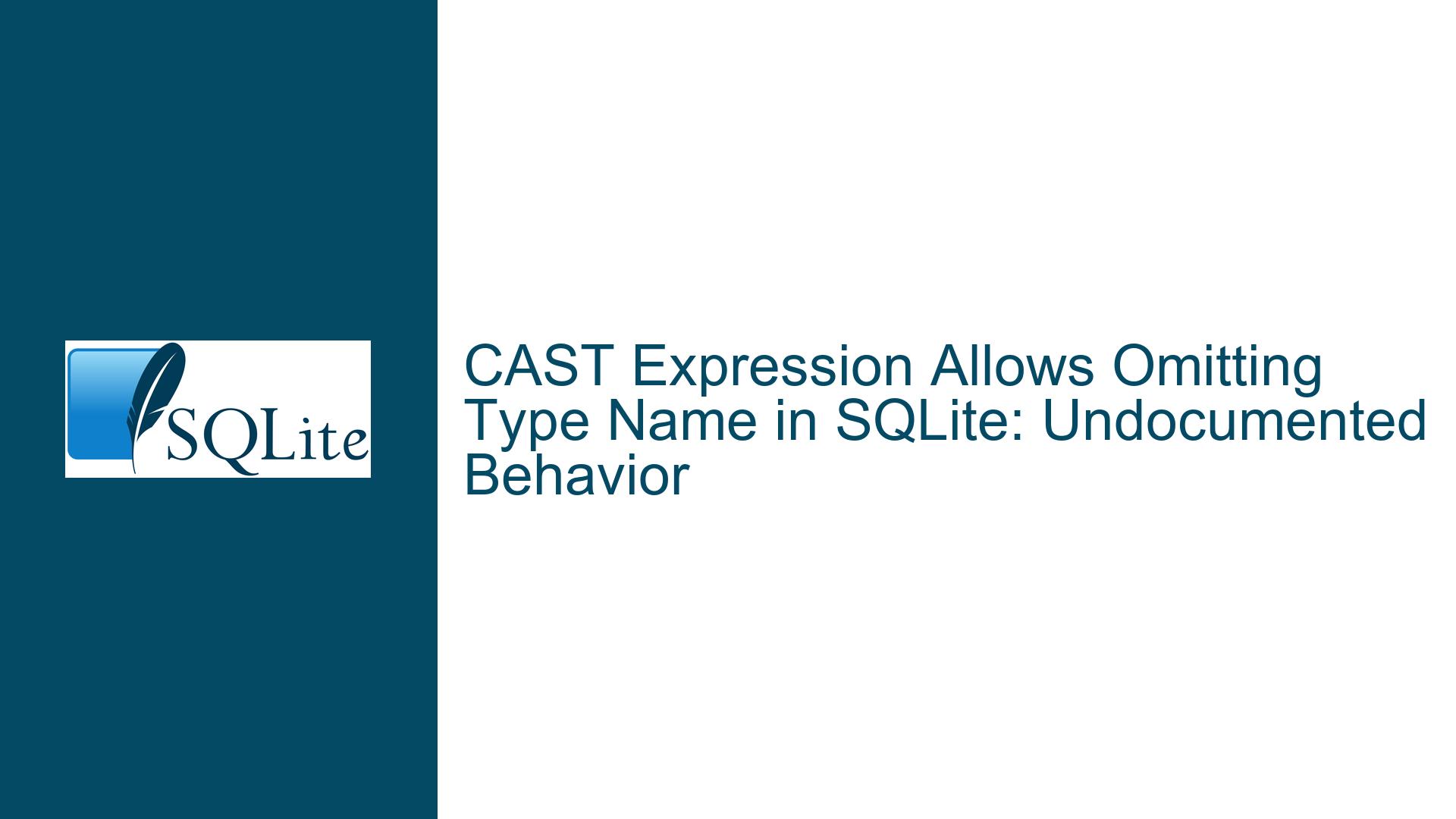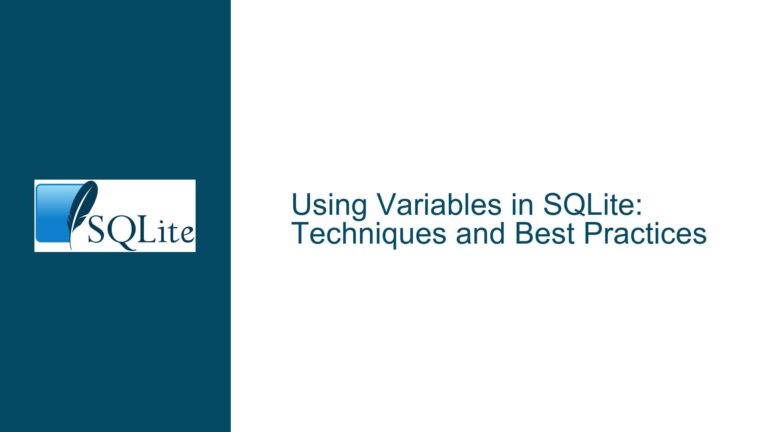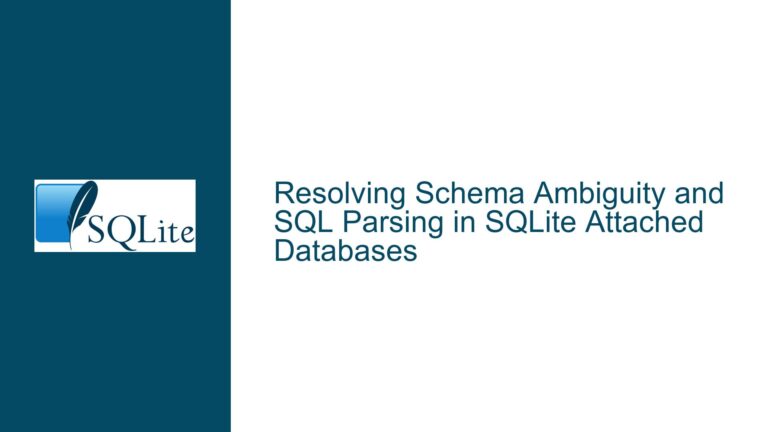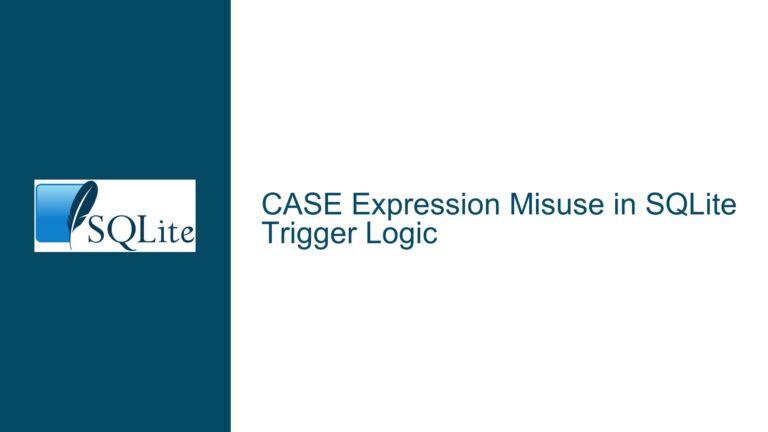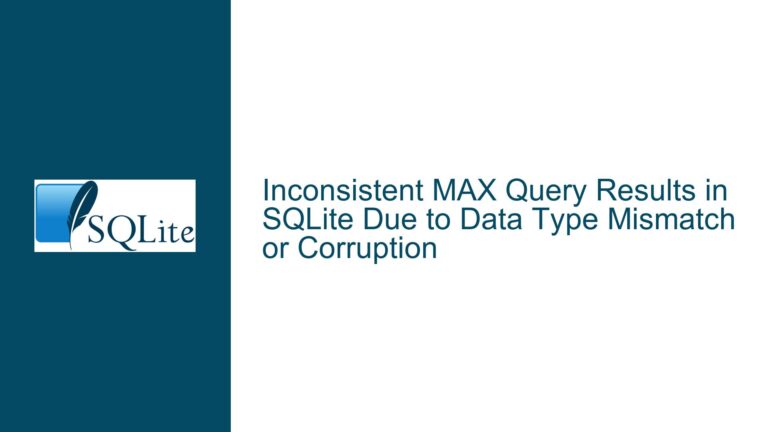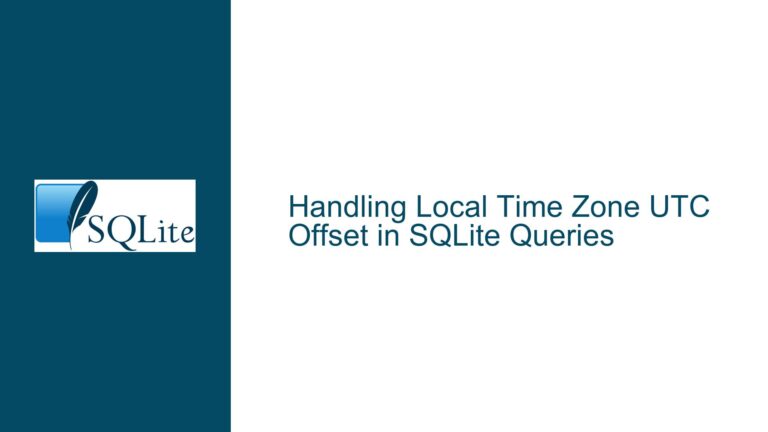CAST Expression Allows Omitting Type Name in SQLite: Undocumented Behavior
Undocumented Optional Type Name in CAST Expression
The CAST expression in SQLite is designed to convert a value from one data type to another explicitly. The standard syntax requires specifying a target type name after the AS keyword, such as CAST(expr AS INTEGER). However, an undocumented behavior exists where the type name can be omitted entirely, resulting in expressions like CAST('42' AS). When executed, this expression returns a value with a numeric affinity (typically INTEGER if the input is a numeric string). This behavior contradicts the documented syntax and introduces ambiguity in type conversion logic.
The absence of the type name in CAST is not addressed in SQLite’s official documentation. The syntax diagram for CAST in the SQLite documentation implies that the type name is mandatory, as it shows a direct path from the AS keyword to the type name. The discrepancy arises from the parser’s grammar rules, which inherit flexibility from type definitions in CREATE TABLE statements. This leniency allows the type name to be omitted, but the resulting behavior is inconsistent with both user expectations and other parts of the SQLite engine. For example, in CREATE TABLE statements, omitting a type name defaults to BLOB affinity, but in CAST expressions, the default shifts to numeric affinity. This inconsistency can lead to subtle bugs when developers assume uniform behavior across SQLite’s type system.
The core problem extends beyond syntax validation. When a type name is omitted, SQLite applies type conversion rules based on the input value’s format, similar to how it handles literals or expressions in a column with numeric affinity. For instance, CAST('42' AS) returns INTEGER, while CAST('3.14' AS) returns REAL. If the input is a non-numeric string like 'text', the result defaults to TEXT. This implicit conversion bypasses the explicit intent of CAST, which is designed to enforce a specific type. The lack of documentation or standardization around this behavior makes it risky to rely on, as future SQLite versions could alter the default handling without warning.
Parser Grammar Inheritance and Default Type Affinity Handling
The root cause of this undocumented behavior lies in SQLite’s parser grammar and its handling of type tokens. In the SQLite source code (src/parse.y), the CAST expression is defined as follows:
expr(A) ::= CAST LP expr(E) AS typetoken(T) RP. {
A = sqlite3ExprAlloc(pParse->db, TK_CAST, &T, 1);
sqlite3ExprAttachSubtrees(pParse->db, A, E, 0);
}
Here, typetoken(T) represents the type name specified after AS. The typetoken rule is inherited from CREATE TABLE statements, where column definitions allow optional type names. The parser’s comment clarifies that a typetoken is zero or more tokens forming a type name, which explains why omitting the type name is syntactically valid. However, this flexibility is appropriate for CREATE TABLE, where omitting a type name assigns BLOB affinity, but problematic for CAST, where the absence of a type name triggers a different set of rules.
The typetoken rule’s inheritance creates a conflict between syntax and semantics. While the parser accepts CAST(expr AS) as valid, the execution engine lacks a defined behavior for this case. Instead of defaulting to BLOB affinity (as in CREATE TABLE), the CAST expression applies numeric affinity to the input. This discrepancy arises because the CAST operation uses a separate code path that does not mirror the CREATE TABLE type-handling logic. For example, when a column is defined without a type name, the storage class defaults to BLOB, but when CAST omits the type name, the input value is coerced to INTEGER, REAL, or TEXT based on its content. This inconsistency violates the principle of orthogonality, where similar syntax should yield predictable outcomes across different contexts.
Another contributing factor is SQLite’s type affinity system, which prioritizes dynamic typing over strict type enforcement. When the CAST expression lacks a type name, the engine falls back to affinity-based conversion rules. This design allows SQLite to handle flexible data types but introduces ambiguity when developers expect CAST to enforce a specific storage class. The undocumented behavior effectively turns CAST(expr AS) into a hybrid operation that combines explicit casting syntax with implicit type conversion logic, undermining the purpose of using CAST for deterministic type transformations.
Resolving Ambiguity and Mitigating Unexpected Casting Results
To address this issue, developers must adopt a multi-pronged approach that combines code analysis, documentation adherence, and proactive query design. Below are actionable steps to mitigate risks associated with the undocumented CAST behavior:
Audit Existing Queries for Ambiguous CAST Usage
Review all SQL queries in the codebase to identify instances ofCAST(expr AS)without a type name. Use static analysis tools or manual inspection to flag such cases. Replace them with explicit type names likeCAST(expr AS INTEGER)to ensure consistent behavior. For example,SELECT typeof(CAST('42' AS))should be rewritten asSELECT typeof(CAST('42' AS INTEGER)).Enforce Explicit Type Names in CAST Expressions
Modify application code or ORM configurations to prohibitCASToperations without type names. Implement validation checks during query construction to reject malformedCASTsyntax. For instance, in a Python application usingsqlite3, preprocess SQL statements to detect patterns likeCAST(... AS)and raise exceptions.Leverage SQLite’s Type Affinity Rules Consciously
Understand that omitting the type name inCASTinvokes numeric affinity, which may not align with the intended conversion. If implicit type handling is required, use SQLite’s built-in functions likeTYPEOF()orCOERCE()to debug affinity-related issues. For example, testSELECT TYPEOF(CAST('text' AS))to observe the defaultTEXTresult and adjust logic accordingly.Advocate for Documentation Updates or Parser Fixes
File a documentation issue with the SQLite team to clarify the behavior ofCASTwith omitted type names. If backward compatibility permits, propose a parser modification to require at least one token for thetypetokeninCASTexpressions. This would align the syntax with documented expectations and prevent accidental misuse.Adopt Defensive Coding Practices for Type Conversions
Avoid relying on implicit type conversions in performance-critical or data-sensitive operations. Use explicit type names inCASTand validate input data before conversion. For example, sanitize string inputs to ensure they match the target type before applyingCAST(expr AS INTEGER).
By addressing the ambiguity in CAST expressions and aligning code with documented conventions, developers can prevent unexpected type conversions and ensure robust data handling in SQLite-based applications.
